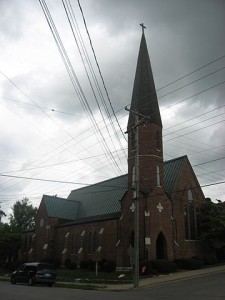 Had a fabulous time over the last few days at the Academy of Parish Clergy annual gathering in Dayton, Ohio. I found the diverse group of mostly mainline pastors to be extraordinarily hospitable, specifically in inviting me to represent The Englewood Review of Books there (Thanks, Bob Cornwall for the invitation!) and in allowing me to share bits of our story here at Englewood Christian Church (briefly recounted in my recent ebook, The Virtue of Dialogue). Also, it was wonderful to meet Carol Howard Merritt, who was the main conference speaker, and chat with her about some of the challenges facing mainline churches.
Had a fabulous time over the last few days at the Academy of Parish Clergy annual gathering in Dayton, Ohio. I found the diverse group of mostly mainline pastors to be extraordinarily hospitable, specifically in inviting me to represent The Englewood Review of Books there (Thanks, Bob Cornwall for the invitation!) and in allowing me to share bits of our story here at Englewood Christian Church (briefly recounted in my recent ebook, The Virtue of Dialogue). Also, it was wonderful to meet Carol Howard Merritt, who was the main conference speaker, and chat with her about some of the challenges facing mainline churches.
Since the outset of this Slow Church project over a year ago, John and I have both had a sense that the basic message of Slow Church — despite our choice to go with a publisher that works primarily with evangelical readers — is deeply pertinent to all churches: evangelical, emerging, and mainline. I want to sketch briefly here a couple of challenges facing mainline churches that were named during the APC gathering and on which our Slow Church work can perhaps shed s0me light: 1) The Nones, 2) The Desire for Conversation as a way of being together and 3) The Need for a New Economics of Church. (I might develop one or more of these into separate, more robust posts of their own, let me know if there is one or more that you particularly interested in hearing more about)…
1) The Nones (a.k.a., The SBNR’s — Spiritual, but Not Religious). Carol did a delightful job of putting her finger on why the basic reasons many SBNR’s are resistant to churches:
– They desire a more holistic faith, meeting God in everyday life
– They are put off by the religiosity and politics of churches
It seems to me that what we are calling Slow Church intentionally addresses both of these concerns. What we are calling churches to is a holistic faith, a shared faith whose roots run deep and one that embraces all of the life we have been given. The middle part of our book, on the theme of Ecology, addresses what Peter Rollins has called our sins of abstraction, our failures to remember that God is reconciling all creation. These sins of abstraction — e.g., nationalism, partisanism (on the Right or the Left), homogeneity, theologies/praxis of hate and exclusion — are the sorts of wounds that have made SBNR’s so adamantly opposed to meeting God in the church community. I’m hopefully that churches that take a more holistic view of our life together and engage SBNR’s not programatically, but as friends and neighbors, we will give them a different idea of what church could be.
2) Desire for Conversation as a Way of Being Together. Conversation is a major theme throughout our Slow Church work, and in the book, we highlight it as the final image with which we want to leave readers, re-imagining church as dinner table conversation. Carol outlined the generational shifts in authority and technology, that leave many with a deep desire for conversation. Many people (and particularly of the younger generations) don’t simply want to be faith consumers, but want to be active participants in a faith conversation.
3) The Need for a new Economics of Church. Many churches and particularly in the mainline denominations are being shuttered because of a perceived lack of resources. While we probably won’t deal directly with this issue in the Slow Church book, there is a good deal of related thoughts to stir our economic imaginations as churches in the chapter on work and the final part of the book on economics, particularly the chapter on on the abundance of God’s provision (and a critique of the myth of scarcity on which all major economic systems: capitalism and communism are based). The perceived scarcity is too often a product of our greed or failures of our imagination. Perhaps one way forward, as Carol so wonderfully pointed out, is in bi- (or multi-) vocational ministry, but not the sort that says to pastors, you need to find a part-time job doing retail or whatever, but rather the sort that leverages the entrepreneurship of the congregation (in the context of the particular place) to find missional ways to generate income as a church community (making artisan breads, running a coffeehouse, selling books, fixing up houses, the opportunities are endless!). And this basic idea leads us into the monastic (or new monastic) vision of common work, of churches sustaining a holistic life together through common work that fits their context and the gifts of their congregation.











